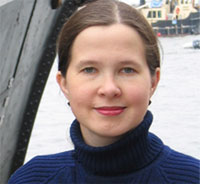talks 2023/24

Hans Hoeken & Tom St.Pierre: The language of us and them
The language of us and them: Constructing walls and building bridges Speakers: Hans Hoeken & Tom St.Pierre Human beings routinely categorize the social world into “us” vs. “them,” and will often favor individuals from their own groups over individuals from others groups. This talk will examine the significant role that language plays in these intergroup…
Read more
Dong Nguyen, Anne-France Pinget: Collaborative Growth: Sociolinguistics, computational and quantitative methods
Collaborative Growth: Sociolinguistics, computational and quantitative methods Speakers: Dong Nguyen, Anne-France Pinget Discussant: Antal van den Bosch Sociolinguistics is a dynamic research area which draws inspiration from various disciplines, including the social sciences, computer sciences and humanities, and utilizes diverse research methods, such as experimental work, fieldwork, and quantitative and qualitative data analysis. Recently, there…
Read more
Marlou Rasenberg, Sterre Leufkens & Marjo van Koppen: Meaning-making beyond the human
Meaning-making beyond the human: linguistic approaches to the study of cat-human interactions By Marlou Rasenberg, Sterre Leufkens & Marjo van Koppen Discussion led by Silvia Terenghi & Tessa van Charldorp ———————– Human and non-human animals draw on a range of embodied resources to constitute social actions: vocalizations (speech), gesture, gaze, body postures, touch and movements….
Read more
Maria del Carmen Parafita Couto
Maria del Carmen Parafita Couto: What if …? Imagining linguistic theory rooted in multilingual data ———————– Abstract In this presentation we will explore a hypothetical scenario: What if linguistic theory had been grounded on bi-/multilingual practices and data, i.e. what if multilingualism had always been recognized as an inherent aspect of the human mind and…
Read more
Dynamics of Youth (DoY)
Dynamics of Youth is a strategic theme of Utrecht University. Within Dynamics of Youth scientists from all fields of expertise study how children and young people develop in our changing society. The strategic theme comprises four communities that focus on different aspects of child development; Early Childhood: Focus on development ranging from conception until 6…
Read more
Audrey Rousse-Malpat
Can you become a good language teacher without a structure-based training? On a Dynamic Usage-based inspired L2 pedagogy from primary school to university. Most foreign language teachers in the Netherlands today have followed what Lightbown and Spada (2013) call a Structure-based (SB) language learning training. This means that they have become proficient in a foreign…
Read more
Henriëtte de Swart & Bert Le Bruyn
Time in Translation – five years later ———————– Abstract In this talk, we report results from the Time in Translation project (https://time-in-translation.hum.uu.nl/) carried out at Utrecht University between 2017 and 2022. Reference to time and events is part of human cognition, but languages vary in the expression of temporal information. We know from the literature…
Read more
Elena Tribushinina
Is a language disorder an impediment to foreign language learning?
Read more
Jakub Dotlacil
Language, Linguistics and Memory
Read more
Joris de Graaf and Tessa van Charldorp
GDPR session
Read more
